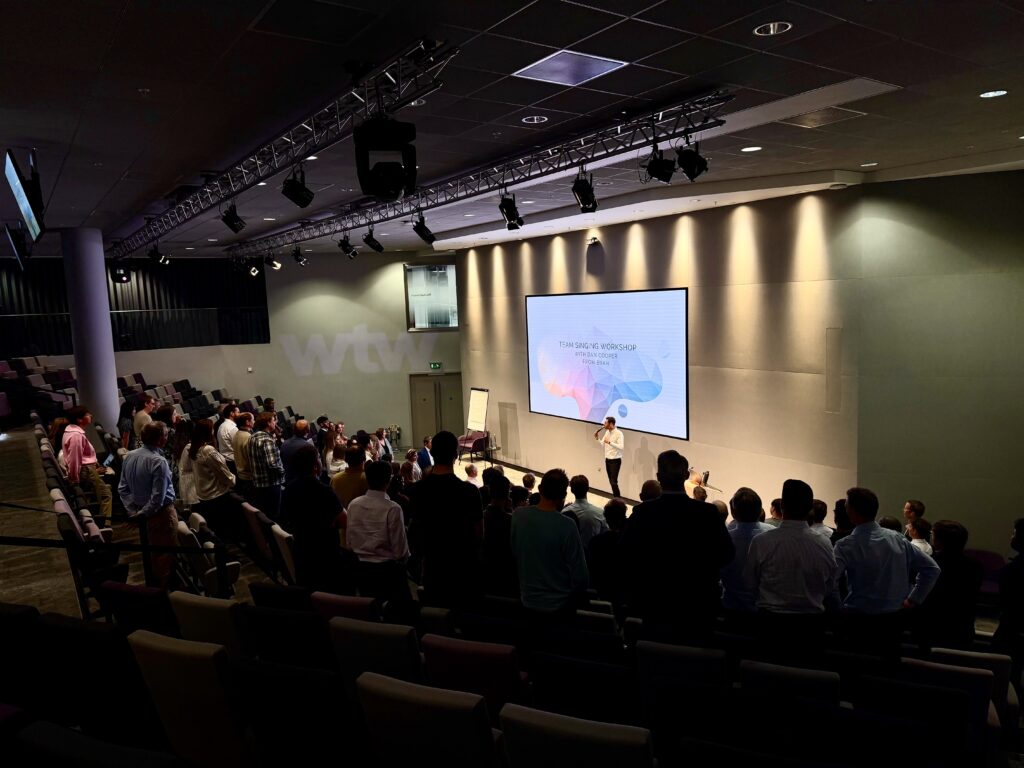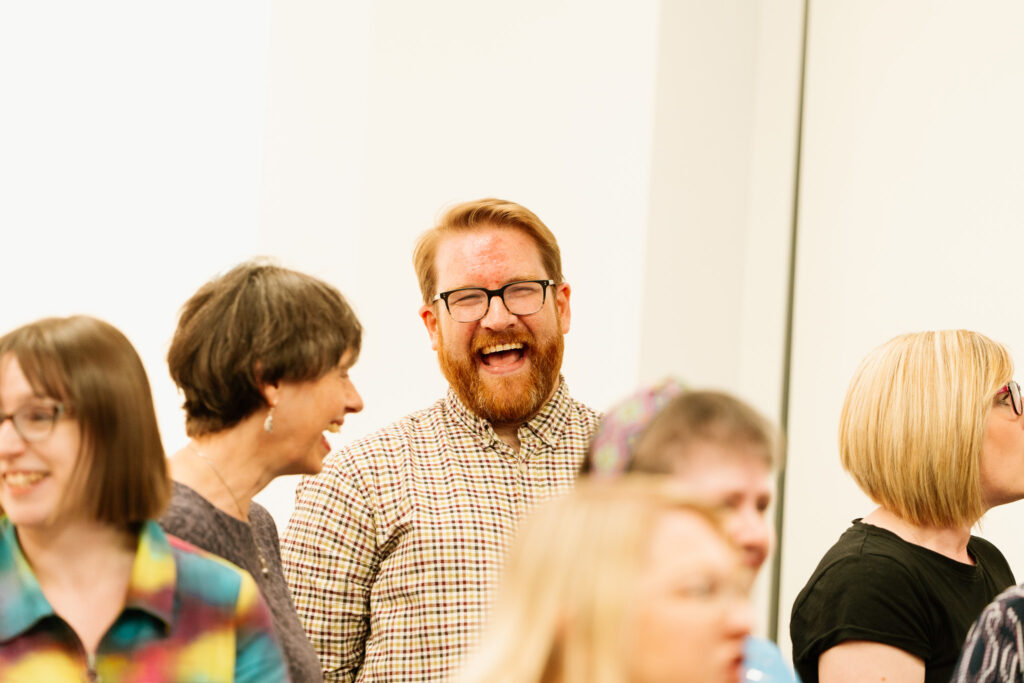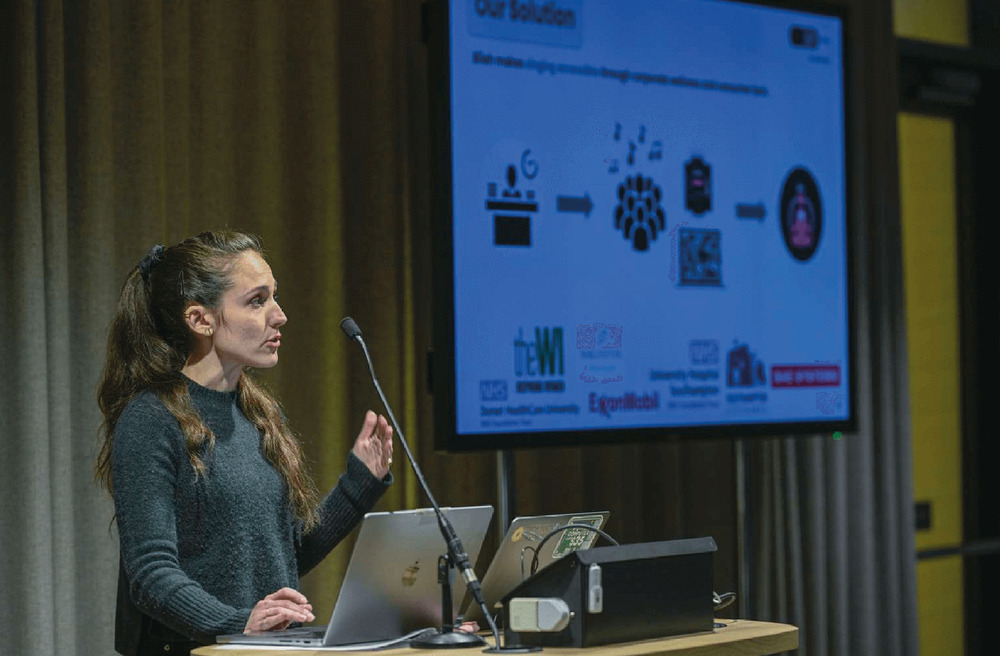Have you ever considered singing for wellbeing?
You can boost the quality of your life by simply connecting with the instrument you were born with!
Don’t believe us?
Discover the staggering headlines/studies on singing that made waves in the media!
Find evidence surrounding everything from singing’s effect on anxiety, depression, long Covid, Alzheimer’s disease, and so much more all in one place.
We’ll be keeping this blog up-to-date as more evidence emerges.
Singing, Wellbeing & Health – How Are They Connected?
Feel free to skip to the section that interests you the most by using the table of contents below:
- Mental Health and Singing
- Social Cohesion and Singing
- Lung Health and Singing
- Work Recovery and Singing
- The Brain and Singing
- Research Resources You May Find Useful
- Online Singing Events
1. Mental Health and Singing
Singing is an aerobic exercise which sees the release of endorphins, the brain’s ‘feel-good’ chemicals.
Endorphins [are] related to an overall lifted feeling of happiness, it gives a feeling of euphoria so it’s all associated with a reduction in stress. In any situation whether it is under stress or [with] any physical ailments, illness, psychological deprivation, singing has the potential to affect our body and mind.
Dr Baishali Mukherjee – Discover The World’s Most Accesible Stress Reliever – by BBC News
Are you or someone you know struggling with mental health issues?
Please know you’re not alone. It’s been a rough few years!
Even before the pandemic, mental healthcare has been underfunded, under-resourced, and overwhelmed.
To add fuel to the fire the Covid crisis sparked a dramatic rise in people experiencing mental health problems.
Cue headings like:
1. ‘Global Crisis’ Over Depression and Treatment Must Change – by Sky News
2. Millions in England Face ‘Second Pandemic’ of Mental Health Issues – by The Guardian
3. The Effect of Social Isolation on Well-Being and Life Satisfaction During Pandemic – by Humanities and Social Sciences Communications
4. 85% of Britons Say Music is Vital to Their Mental Health – by nme.com
So, where do we go from here?
What solutions can we share with the world that will truly make a difference to all?
Before the pandemic, the UK government realised ‘The Power of the Arts and Social Activities to Improve The Nation’s Health’ (GOV.UK).
Could singing specifically, given its accessibility, play a pivotal role in the global response needed?
We’re not the only ones who think so!
Mental Health and Singing in The News:
1. The Healing Power of Singing – by The New York Times
[Singing] has profound effects on the emotions … inducing states of relaxation which are particularly useful as an antidote to depression, anxiety and fatigue.
R Stacy – Studies of Neuroscience and Music
2. Singing to #EndTheStigma – by The Guardian
By the end of the two months, choir members with mental health problems were more positive about themselves. When it came to wellbeing, results between people with and without mental health problems improved by the same margin; both groups felt increased levels of wellbeing, enjoyment and connectedness.
Sarah Johnson
3. Remembering Who We Are And What It Feels Like to Be Alive – by The Guardian
You reach inside for your voice, what comes up with it are things you’ve been pushing down in order to carry on. So you can excavate some of the grief that’s in the heart.”
Briony Greenhill
4. Singing Improves Health and Happiness – And Is The Perfect Icebreaker – by Oxford University
Music making exercises the brain as well as the body, but singing is particularly beneficial for improving breathing, posture and muscle tension. Listening to and participating in music has been shown to be effective in pain relief, too, probably due to the release of neurochemicals such as β-endorphin (a natural painkiller responsible for the “high” experienced after intense exercise).
Jacques Launay, Postdoctoral Researcher in Experimental Psychology, University of Oxford
5. English Nation Opera proves anyone can sing and improve their mental health – by The Guardian
Singing is very athletic and you are using a lot of your muscles,” said the tenor Nicky Spence, who will help mentor participants. “Opera singers are really strong, you have to really look after yourself.
Edgar-Jones
So, if singing has the power to create such a positive impact, why isn’t everyone doing it?
For too long, many people believe that those who can sing are those, who the West has defined, as good at it.
When in fact, we can ALL sing…if we choose to.
That’s why we’re on a mission to reframe how people think about and experience their voice from the ground up.
Our ever-growing community understands the importance of singing and feels empowered to explore their voice every single day.
Confidence in our own voice exists on a spectrum.
Yet, by exercising it just like we would a muscle, we can inspire more strength not only in ourselves but our communities too.
2. Social Cohesion and Singing
You can’t not be happy when you’re singing. It brings out the best side in everyone and a feeling of togetherness. I think there’s a lot of power in finding songs that really connect with how you’re feeling. It can be quite therapeutic.
Yasmin Khaliq – Why People are Desperate to Sing Amid Pandemic – BBC News
It isn’t a coincidence that when the world was locked down or in despair people around the world took to their balconies and the streets to SING, to spark joy.
It was instinctual, it was therapy, it was community spirit embodied!
Think about football – these people aren’t singing just to be good at it, they’re singing together in celebration, to lift us, and for the pure fun of it!
Singing has the power to make everyone perceive certain emotions without bias, boundaries or limitations and connects us in ways that other things simply can’t.
Social Cohesion and Singing in the News:
Singing is to coast into the hearts of the people who listen, to tell them that life is to live, that love is there, that nothing is a promise, but that beauty exists, and must be hunted for and found.
Joan Baez
2. Social Prescribing – Arts Council England published a dedicated Creative Health and Wellbeing target delivery plan! (August 2022)
Making and experiencing creativity and culture transforms people and communities’ quality of life. Take a look at how creativity is supporting health and wellbeing, the evidence for creative health, and help us to spread the word about how creativity and culture can make us feel better.”
Arts Council England
3. Lung Health and Singing
In Gloucestershire, hospitals are now referring patients with lung conditions to singing sessions. Sounds counter-intuitive? But no. Singing helps people, even with chronic lung conditions.
GOV.UK Website
Did you know singing has been used to help people with long-term chronic respiratory conditions such as COPD (chronic obstructive pulmonary disease) for some time?
It’s true! The British Lung Foundation even run a programme called ‘singing for lung health‘.
In this short film about the sessions run by the BLF, one participant noted:
After about 10 minutes I’m able to switch my oxygen off, because I feel I’ve got more control over my breathing.
Lynne
Useful Resources on Singing for Lung Health
4. Work Recovery and Singing
If you can engage in something creative or learn something new, it is a great way to boost the kind of focus and motivation we are lacking at the moment…A sense of progress from learning a skill or craft are key to reversing the impact of stress and anxiety that underpin fatigue.
Peta B – Always tired? What to do if you pandemic fatigue. – by The Times
Wondering what recovery is and if you’re getting enough of it?
It occurs after the working day and plays a crucial role in the overall quality of our life.
Your body and mind both need time off.
Tending to our optimal well-being shouldn’t be reactive ie. only starting to look after ourselves more when we’re feeling low.
Rather, a proactive approach in the good management of good mental health over the long term is key to avoiding burnout and maintaining a good quality of life even through the hard times.
If you’re still not 100% sure what work recovery is, or how important is that get enough of it.
You can read our blog all about it here.
For frontline workers, work recovery has been a huge challenge during the Covid crisis.
How Singing can Aid Better Work Recovery:
This study suggests that organisations may benefit from encouraging employees to consider creative activities in their efforts to recover from work.
5. The Brain and Singing
Did you know scientists have found an area of the brain that responds selectively to singing?
In the paper, the researchers speculate about characteristics of singing that make it a distinct category in need of its own neuro-dynamic signature.
Conor Feehly
The evidence surrounding singing’s effect on the brain is mounting!
So much so, that we decided to dedicate an entire blog to the subject.
You can read our blog about it here.
The science is especially exciting when it comes to age-related neurological disorders, memory function, and even seizures.
Stay tuned for more links on this subject coming soon.
6. Research Study Resources
Kudos to all the scientists and researchers doing the work to PROVE the fascinating findings on singing for wellbeing.
- Immune Systems Response to Singing – University of California
- Singing Fosters Mental Health & Wellbeing – findings from the East Kent ‘Singing for Health’ network project.
- ‘Group singing as a resource for the development of a healthy public: a study of adult group singing’ – by David A. Camlin, Helena Daffern & Katherine Zeserson
- The Power of Music: An Exploration of The Evidence – published on OSF Home
- Professor Jörg Fachner expert in Music Therapy
Books on Singing you may Find Interesting:
- James Sill’s Book “DO Sing” – on how to get into singing.
- Daisy Fancourt’s Book “Arts in Health: Designing and Researching Interventions”
7. Accessible Online Singing Events for All
If you’re ready to start singing for wellbeing and feel the benefits for yourself, you’re in luck!
We host a zoom series that supports singing for wellbeing through 30-minute sessions hosted by a variety of renowned vocal coaches.
Will you join us in our mission to inspire more health and happiness in the world through our shared love of singing? Email us to join our group singing community today!







